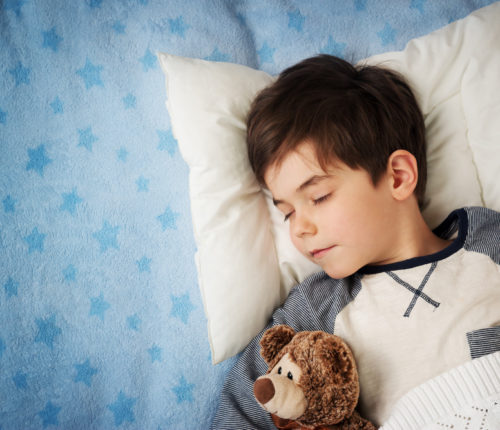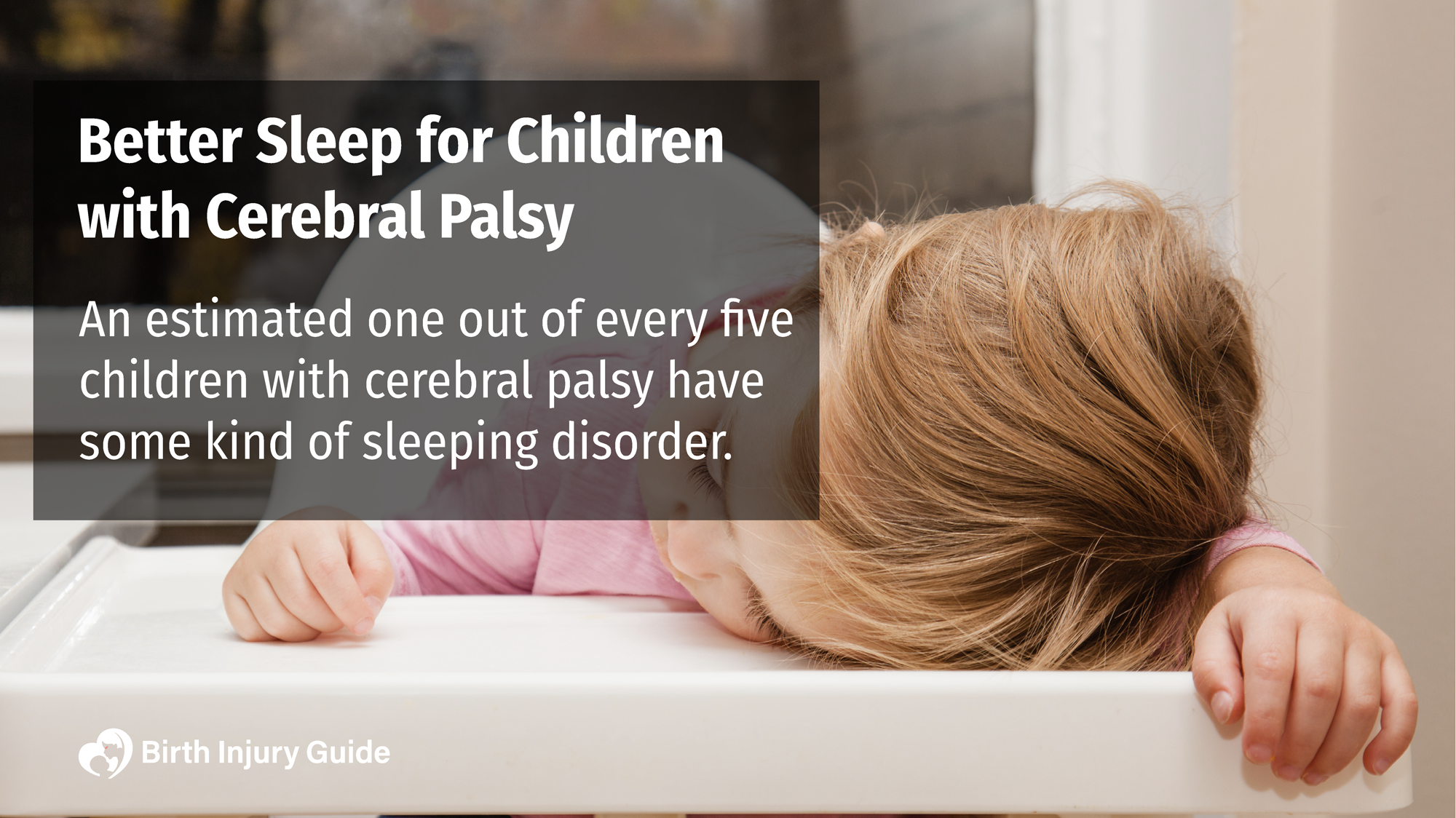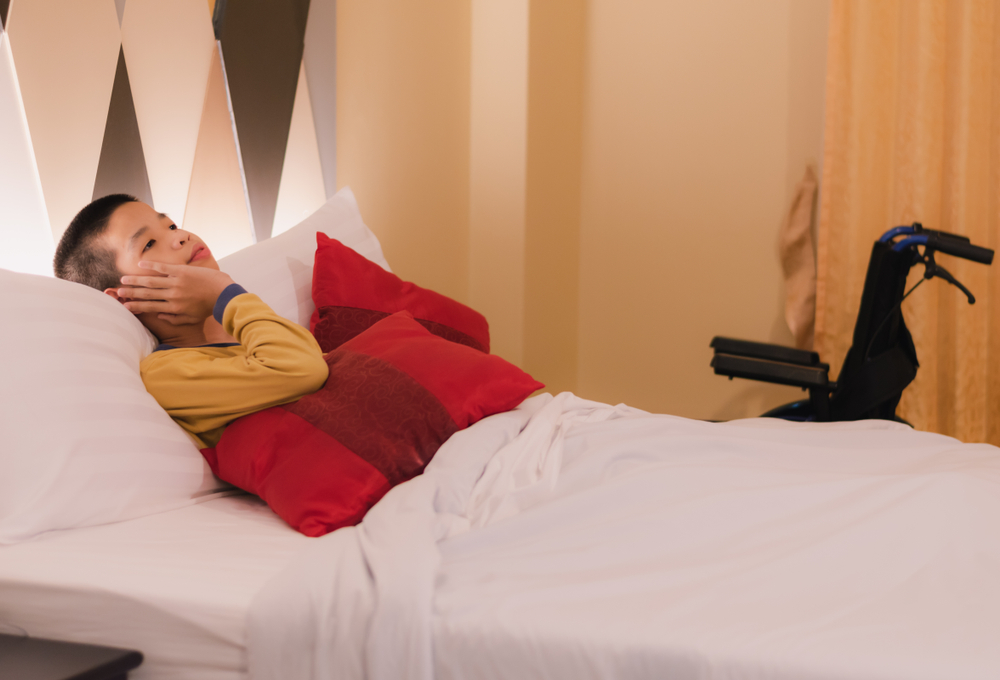
Better Sleep for Children with Cerebral Palsy
It’s common for children with cerebral palsy to have sleeping difficulties. Better sleep for children with cerebral palsy often involves a multidisciplinary approach.

Why Children with Cerebral Palsy Have Sleep Difficulties
Sometimes children with cerebral palsy have trouble sleeping because of their condition and related symptoms. Some of the most common reasons for sleep difficulties are:
- Due to breathing problems while laying down
- Due to spasticity issues making it difficult to get comfortable
- Back pain related to scoliosis or muscular or spinal injuries
- Vision difficulties causing the child to not identify if it is dark outside
Any number of these factors can be significant enough for your child to wake up during the night and not get a good night of sleep. This can further affect their health, as well as the health of the family members around them.
Better Sleep for Children with Cerebral Palsy
Fortunately, there are some things you can do to help your child get a better night’s sleep. Below, we discuss some of the ways that you and your child can enjoy a more restful sleep.
Exercise
Perhaps one of the best ways to get your child to sleep better is through exercise. Additionally, exercise with the aid of your child’s physical therapist improves balance and coordination but also strengthens muscles. If your child has problems with spasticity, exercise can help your child increase muscle control.

If your child has problems with respiration, you may need to see a speech and language therapist to accompany exercise. But, generally, exercise promotes better breathing and in turn, better sleeping.
A few examples of exercises for children with cerebral palsy include:
- Aquatic therapy
- Range-of-motion exercises, including leg rotations, heel extensions, leg raises, trunk rotations, and hip flexions
- Strength, balance, and coordination exercises
- Daily stretching
- Slow walking or slow wheeling for children in wheelchairs
Calming Routine
Establishing a calming routine before bedtime will greatly improve the chances of better sleep for children with cerebral palsy. Therefore, too many activities and too much stimulation prior to bedtime usually results in a difficult time falling asleep and staying asleep.
An effective calming routine should always be consistent. A progression that many families find helpful include:
- Dinner
- A warm, calming bath
- Brushing teeth
- Story time
- Bedtime
Keep in mind that it takes time to see results, but children who understand what to expect each night have an easier time transitioning to sleep when compared to children who don’t have a set routine.
Find the Right Sleeping Position
Speak to a pediatric occupational therapist and physiologist about the optimal sleeping position for your child. Furthermore, you may also want to ask if there are any kind of accommodations that could be made to your child’s bed to help support him or her better during sleep.

Some common considerations include:
- Some children may have trouble breathing if they are flat on their back, so you may need get a bed that tilts up slightly so that they can breathe better.
- If your child has muscular or spinal pain, you may want to get a body pillow to put between his or her knees and around the torso for more support while sleeping.
- Your child’s therapists may also recommend a certain kind of mattress or certain kind of pillows.
Naps
While it sounds counter-intuitive that a child should sleep during the day to sleep better at night, some children might have difficulty sleeping because they’re too exhausted at night. Therefore, if your child takes a one- or two-hour nap at midday, he or she may be a little more relaxed when it’s time to go to bed later in the evening.
Healthy Diet
Inadequate nutrition and a diet based on foods with empty calories can heighten the risk of developing sleeping issues. According to the National Institutes of Health (NIH); the majority of children with cerebral palsy will experience some problems with feeding and/or choking while swallowing. Therefore, they are at an increased chance of receiving inadequate nutrition, leading to a host of possible difficulties and poor growth and development.
In addition to feeding children with CP smaller, more frequent meals; experts suggest that parents should ensure there is a variety of the following foods in the child’s diet:
High-calorie fruits
- Mangos
- Bananas
- Avocados
- Prunes
- Figs
Healthy fats
- Coconut oil
- Coconut milk
- Seafood
- Cheese
- Whole eggs
Leafy green vegetables
- Spinach
- Kale
- Collards
- Broccoli
- Cabbage
Foods containing natural probiotics
- Yogurt
- Kefir
- Honey
- Sauerkraut
- Miso
Underlying Medical Issues
Sometimes, better sleep for children with cerebral palsy comes after identifying underlying medical issues. If there is an underlying medical problem, it should be identified first before other strategies are utilized. Children with cerebral palsy may suffer from medical issues that affect sleep, such as:
- Acid reflux
- Sleep apnea
- Seizures
Your child should get a medical evaluation to determine what, if any, medical issues are contributing to sleeping problems.
Your child’s doctor may conduct a polysomnogram (PSG), which monitors a number of body functions while the child is sleeping. In turn, physicians can detect brain and eye movement, muscle activity and breathing functions as the child sleeps.
Another medical procedure that helps physicians detect underlying medical issues is the multiple sleep latency test (MSLT); which allows doctors to see how long it takes for the child to enter into the state of sleep after napping.
The Importance of Better Sleep for Children with Cerebral Palsy
Poor quality sleep can affect more than the sufferer. Especially in children, poor sleep also affects the parent(s) or caregiver(s), and sometimes even siblings or other family members. Moreover, sleep dysfunction not only interrupts household sleep schedules; but it also affects how the child behaves and performs during the day. Research shows that children show more psychiatric symptoms when they get inadequate sleep. Some studies also suggest children perform more poorly at school when they do not get enough sleep.
Subsequently, poor sleep can also impact the child’s family members. As much as we all want to believe we stay positive and encouraging, the truth is that if we are fatigued or stressed, we often show that through our attitudes and behaviors. Studies show that parents of children with neurodevelopmental conditions often report a lack of quality sleep. Parents report feeling more irritable and have more stress. Parents also report that poor quality sleep and familial demands impact their work and social lives.
The above represent numerous reasons why better sleep for children with cerebral palsy is so important. Talk to your child’s healthcare provider or occupational therapist if you have questions about your child’s sleeping habits.

